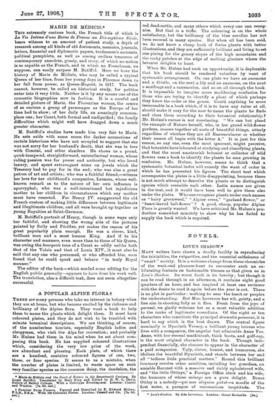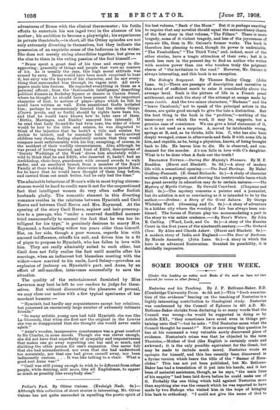NOVELS.
LOVE'S SHADOW.*
MANY writers have shown a deadly facility in reproducing the trivialities, the vulgarities, and the essential selfishness of "sm-art" society. It is a welcome change from these chronicles of the week-end pleasure-hunt to encounter such an ex- hilarating fantasia on fashionable themes as that given us in Love's Shadow. Its worst fault is its brevity ; but though it can be read through in an afternoon, it contains eight good quarters of an hour, and has inspired at least one reviewer with the desire to read it again before the year is out. There is no plot in particular : nothing to sear the heart or perplex the understanding. But Miss Leverson has wit, gaiety, and a fine aim in shooting folly as it flies. Fresh from the joys of perusal, we gladly welcome her as a most valuable addition to the ranks of legitimate comedians. Of the eight or ten characters who constitute the principal dramatis personae, it. is hard to say which is the best drawn. The central figure nominally is Hyacinth Verney, a brilliant young heiress who lives with a companion, the angular but admirable Anne Yeo. Anne, with her eternal mackintosh, thick boots, and golf-cap, is the most original character in the book. Though inde- pendent financially, she chooses to appear in the character of a paid companion. Ugly, clever, honest, and humorous, she idolises the beautiful Hyacinth, and stands between her and all "tedious little practical matters." Round this brilliant luminary revolve other satellites, including her guardian, an amiable Baronet with a massive and richly upholstered wife, and "the little Ottleya," a Foreign Office clerk and his wife, the humours of whose nthtage are a pure delight. Bruce Ottley is a nobody—qui sese aliquem putat—a noodle of the first water, a paragon of unconscious ineptitude. The • Love's Shadow. By Ada Leverson. London: Grant Richards. [Is.]
adventures of Bruce with the clinical thermometer ; his futile efforts to entertain his son (aged two) in the absence of his mother ; his ambition to become a playwright; his experiences in private theatricals,—in short, all the Ottley episodes are not only extremely diverting in themselves, but they indicate the possession of an exquisite sense of the ludicrous in the writer. She does not merely string absurdities together, but gives us the clue to them in the ruling passion of the fool himself ;—
" Bruce spent a great deal of his time and energy in dis- approving ; generally of things and people that were no concern of his. As is usually the case, this high moral attitude was caused by envy. Bruce would have been much surprised to hear it, but envy was the keynote of his character, and he saw every- thing that surrounded him through its vague mist. All news- papers made him furious. He regarded everything in them as a personal affront ; from the fashionable intelligence,' describing political dinners in Berkeley Square or dances in Curzon Street, where he thought he should have been present in the important character of host, to notices of plays—plays which he felt be could have written so well. Even sensational thefts irritated him ; perhaps he unconsciously fancied that the stolen things (Crown jewels, and so forth) should by rights have been his, and that he would have known how to take care of them. 'Births, Marriages, and Deaths' annoyed him intensely. If he read that Lady So-and-So had twin sons, the elder of whom would be heir to the title and estates, he was disgusted to think of the injustice that he hadn't a title and estates for Archie to inherit, and he mentally held the newly-arrived children very cheap, feeling absolutely certain that they would compare most unfavourably with his boy, excepting, of course, in the accident of their worldly circumstances. Also, although he was proud of having married, and fond of Edith, descriptions of 'Society Weddings of the Week' drove him absolutely wild— wild to think that he and Edith, who deserved it, hadn't had an Archbishop, choir-boys, guardsmen with crossed swords to walk under, and an amethyst brooch from a member of the Royal Family at their wedding. New discoveries in science pained him, for he knew that he would have thought of them long before, and carried them out much better, had he only had the time."
The admirable behaviour of Bruce's wife in most trying circum- stances would be hard to credit were it not for the unquestioned fact that intelligent women do very often suffer foolish husbands gladly. The romantic element in this diverting romance resides in the relations between Hyacinth and Cecil Reeve and between Cecil Reeve and Mrs. Raymond. At the opening of the story Cecil Reeve, nephew and heir-presump- tive to a peerage, who "under a reserved dandified manner tried unsuccessfully to conceal the fact that he was too in- telligent for his type," is genuinely desirous to marry Mrs. Raymond, a fascinating widow ten years older than himself. She, on her side, though a poor woman, regards him with amused indifference, rebuffs his suit, and drives him in a fit of pique to propose to Hyacinth, who has fallen in love with him. They are really admirably suited to each other, but Cecil does not fully realise the fact until months after his marriage, when an indiscreet but blameless meeting with the widow—now married to his uncle, Lord Selsey—provokes an explosion of jealousy on Hyacinth's part, and Anne, by an effort of self-sacrifice, intervenes successfully to save the situation.
The quality of the entertainment furnished by Miss Leverson may best be left to our readers to judge for them- selves. But without discounting the pleasures of perusal, we may close our notice with a few typical specimens of her mordant humour :—
Hyacinth had hardly any acquaintances except her relations, but possessed an enormously large number of extremely intimate friends."
"So many artistic young men had told Hyacinth she was like La Gioconda, that when she first saw the original in the Louvre she was so disappointed that she thought she would never smile again."
" Anne's wooden, inexpressive countenance was a great comfort to Sir Charles, in some moods. Though she was clever enough,
she did not have that superfluity of sympathy and responsiveness that makes one go away regretting one has said so much, and disliking the other person for one's expansion. One never felt that she had misunderstood, nor even that she had understood too accurately, nor that one had given oneself away, 'nor been indiscreetly curious. . . . It was like talking to a chair. What a good sort Anne was!"
" Cecil was still young enough to wish to be different from other people, while desiring, still more, like all Englishmen, to appear as much as possibly like everybody else."























































 Previous page
Previous page